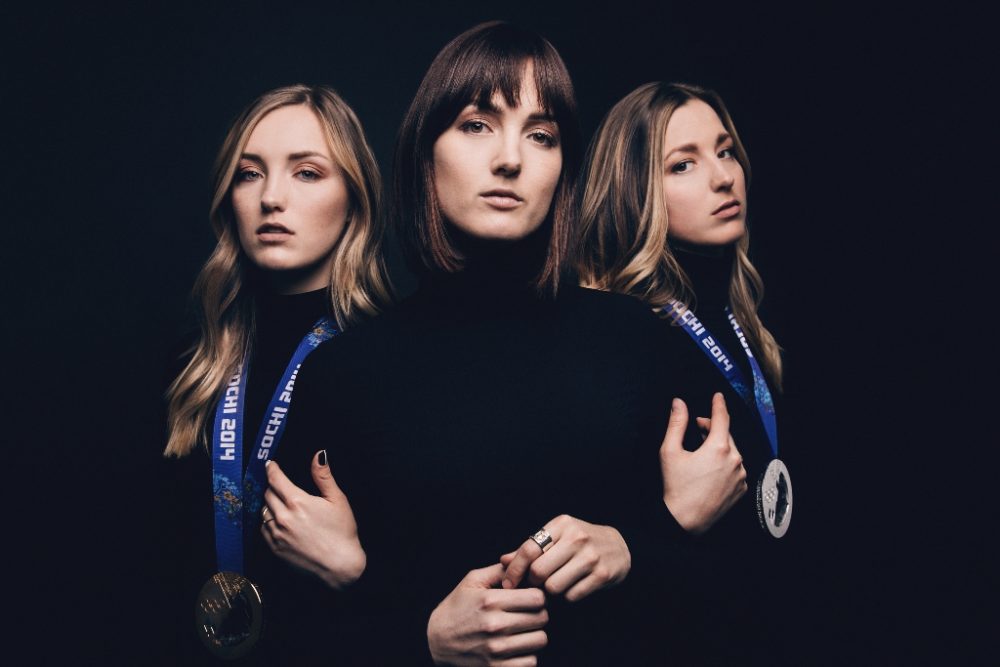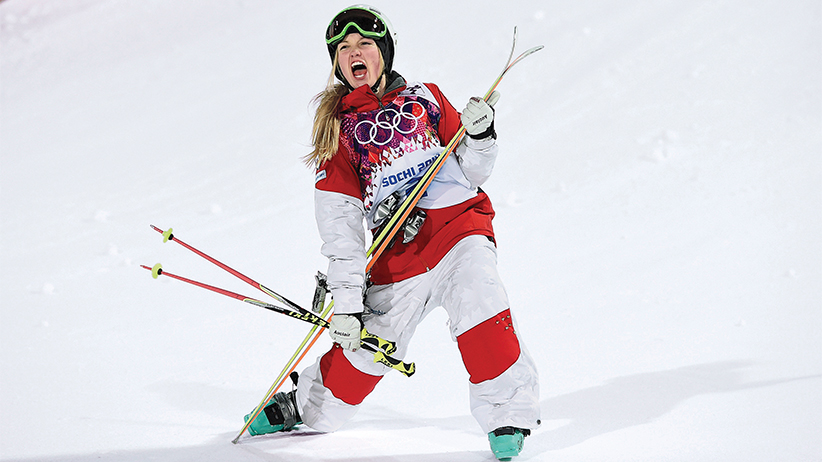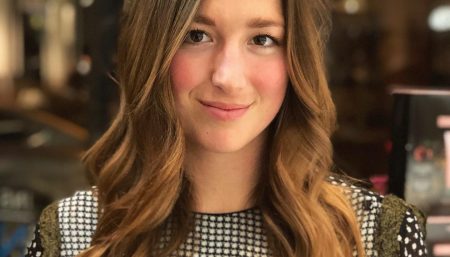
Ms. Namita Nayyar:
You were only 16 when you won the FIS World Cup, becoming an inspiration for thousands of women who look upto you. Provide us an insight into a day in your life.
Ms. Justine Dufour-Lapointe:
After waking up, I have an amazing breakfast, for me my breakfast is the most important. I eat a ton of fruits in the morning and even in my competition days. Then I have my green smoothie.
Then we do a warm-up, an hour of warm-up. Then we go to some hill for a run, normally a stretch would be 6-8 runs, but it depends on the snow condition. That takes around 2-3 hours. Then we go back to the gym straight and work out there for about an hour, then we have a physiotherapy or muscle treatment.
I love to cook actually, so we make our own dinner. It’s my way to do my thing and stop thinking. It helps me to follow my recipe and make something to eat, which we always do together. Before going to bed, I do a little bit of stretching. This is how my training day looks like.
But when I’m back home and I’m not training, I just like to be a woman. I see my friends, go to a great restaurant, have coffee, and have fun. I love shopping, I love fashion. My sisters and I, we always try to be fashion forward. So we try to find the best luggage that we can find. If not, I just like to cook, like I said, when I’m back home. I love photography also, especially when I’m travelling. I like to capture moments and keep them in my journal, I like writing in my journal, it helps me to let everything out and when you write it down, your brain can stop thinking after that. You can let out your fears, and it’s actually a very good exercise for everyone. It’s a good way to learn about yourself.
Ms. Namita Nayyar:
How does it feel to become the 2018 Silver medalist at the Winter Olympics? Also, share with us your preparation, training and motivation that has helped you to become an Olympic Champion?

Ms. Justine Dufour-Lapointe:
Going to Pyeongchang was really different. As an athlete, when I got to Sochi, I was so young. I was just driven by this dream, without knowing what it was actually. I prepared with my team so well that on the day I was just doing it and not thinking. I could feel the pressure, but I was so connected in the moment that I was able to give good performance at the right moment and end up with a Gold medal, which was amazing, I was just not prepared for the after. But I think because I was sharing the same experience, the same life-changing with my sisters Chloe and Max, I think it helped me so much. They helped me stay grounded through this life-changing experience. At first it was shocking, because being only 19 years old, winning a Gold medal, every eyes are on you, have to be a role-model, it’s a lot of pressure and your life is changing and nobody is ready for that. But because I was not alone and I was with another amazing person like my sister, it helped me stayed grounded.
Going to Pyeongchang, it was Chloe’s third Olympics and my second Olympic. The second Olympic Games were so different, you know what you’re going to see and you can expect things, but you cannot compare. It will look a lot alike, but don’t get trapped into it. It’s a little tricky, I got a lot of pressure going to Pyeongchang, a lot of interviews, a lot of people saying you have to defend your title.
I was like no I’m not defending my title because I’m going to be an Olympic Champion for the rest of my life, and nobody can take that back. I can go and win a lot of medals, that’s what I said.
But coming here we got a lot of challenges. The past year was one of the hardest years of our life. One year before the Olympic Games, my mother got diagnosed that she was having a lung cancer, so that changed a lot, because we are very close in our family. Our mom is our rock, she is a solid person, that I always count on and when I felt like talking to someone, it would be my mom, she knew me so well. So it really changed me.
So going to Pyeongchang and train was hard, because I was crying for no reason sometimes, my heart felt heavy and so full of emotion. But it was then diagnosed that our mom was in remission in September, which was a miracle, because she fought so hard and won her battle, which was an inspiration for me. So going to Pyeongchang, I thought now I’m free and my mom will be there at the bottom of the course, my family, my sisters will be there with me and there could be worse things than that. So I went to Pyeongchang with so much more courage, and so much more strength. I thought this is my day and my only chance after four years, and after all the hard work and the crazy past year, I needed to enjoy that for me. So let’s do this!
Ms. Namita Nayyar:
You were the Olympic champion in the moguls event at the 2014 Winter Olympics and then won a silver medal in moguls at the 2018 Winter Olympics. How have the two victories been different and satisfying in their own way?
Ms. Justine Dufour-Lapointe:
The difference between those two was that I changed. I was a little less prepared in 2014, which was perfect then, in 2018, I was way more prepared and more conscious about what was going on, I knew what I was able to control and I think I had a great work done with my psychologist, to calm me down, which is easy and simple. I was able to control my thoughts and decide what to think about and to be in the moment.
So for me, those two medals are of different colors for sure, but the silver medal means so much more, because I know how hard I worked every single day. It was hard to put my skiis on and just go ski-train. Last year was so horrible, that for me to have the courage to step up and give this amazing performance in Pyeongchang where all the world was watching me and with all the pressure, I decided to control what I wanted and I decided that I want to cross that finish line and me proud of myself, my skiing and knowing that I gave my everything out there. So I have no regrets and for me that medal was a victory, for myself, to be able to prove to myself that I was able to do it again. And do it with my family, after all that we have been through, so it was way more than a medal, it was victory for me and my family. So it’s going to be more than just a Silver Medal.
Video
Disclaimer
The Content is not intended to be a substitute for professional medical advice, diagnosis, or treatment. Always seek the advice of your physician or other qualified health provider with any questions you may have regarding a medical condition.
